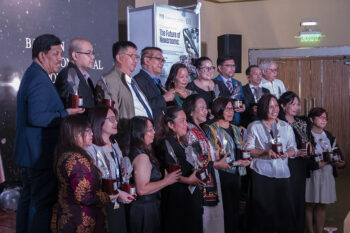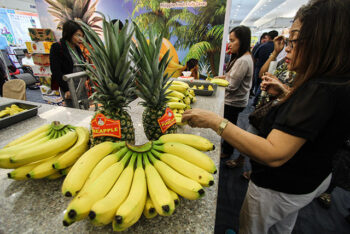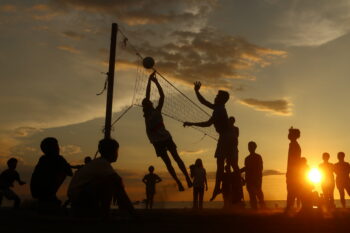
QUEZON CITY (MindaNews / 01 May) — Advanced Happy Hariraya! Eidl Fitr Mubarak, everyone! The blessed month of Ramadan is almost over and we can face the challenges of the year ahead with renewed hope, with a refreshed spirit.
Summer is here and we are all complaining about how it is getting hotter every year. Climate change is here to stay. We either have to adapt because we don’t think we can do anything to stop global warming or we can do something about it. For those of us who live in conflict-affected areas, climate change can increase the risks of violent conflict. It can challenge conflict recovery and peacebuilding, as droughts and natural disasters – such as worsening impact of typhoons – reduce the productivity of agriculture, a sector supporting the livelihood of majority of rural Mindanao. As for women, existing inequalities such as access to agricultural services and opportunities make their lives even more challenging. Why does government still think a farmer is male? There are more women who work in agriculture, from farming to gardening to marketing harvests. Their productivity lessens the poverty that is a contributing factor to armed conflict. They surely need to be recognized as active participants.
Women and girls can be effective agents of change in addressing climate change, particularly in conflict affected communities and fragile societies. The Philippines’ National Action Plan for Women, Peace and Security has recognized this and has supported women (and girls) meaningful in addressing environmental issues. #WPSASEAN.
Our guest on “She Talks Peace,” Ann Dumaliang, is one empowered young woman who had decided, from childhood, to protect the environment. She and her sister Billie, run the Masungi Georeserve Foundation (MGF), a conservation project powered by geotourism, education, and sustainable development located in Baras, Rizal, Philippines. Their father, Ben, reforested the denuded Masungi Georeserve. Ann and Billie spent their weekends helping their dad, growing up to become eco-warriors and the stewards of Masungi. Ann, a National Geographic Explorer and Ashoka Fellow, recently represented MGF at the prestigious 21st Global Summit World of the Travel & Tourism Council (WTTC). The globally awarded Masungi Georeserve Foundation has received recognition for its eco-tourism initiatives from the WTTC in 2018 and from the United Nations World Tourism Organization in 2019.
Ann shared with us the beginnings of the Masungi nature reserve, the many difficulties and challenges they face in maintaining it, what the reserve accomplishes, the true but often ignored cost of destroying natural resources, her hopes for the future, and the kind of mindset necessary to ensure a good future for the world.
Ann recalled, “when we first arrived there as children, it was a completely barren landscape. We would be under the heat of the scorching sun because there was no forest cover at all, playing with goats and the grass that had been cut down so people could pass through. That’s what the place looked like early on.” From 1996 to 2016, she witnessed her father and his team of engineers care for the land. It was a difficult task, the rangers would be harassed, arrested for things they hadn’t done at the behest of powerful lords who coveted the revived land. But the Dumaliangs prevailed. Today, the Masungi Georeserve is a sanctuary for endangered species of Luzon and for weary city folk who look for a peaceful place to commune with nature and breathe.
The challenges and harassment have increased in direct proportion to the growing health of the sanctuary. The rich and powerful have managed to construct resorts inside the protected reserve. The rangers have been beaten up and threatened with imprisonment. The Dumaliangs went to Congress to report the violations. Will anything be done? Let’s hope the next administration will. Ann remains optimistic. Particularly as the sanctuary is also a center for ecotourism or geotourism, as she puts it.
We asked Ann how they implement their ecotourism programs in a sustainable way. The Foundation does employ a lot of workers and tourism helps the communities around the reserve.
Ann explains, “We put heavy emphasis on protection. We supplement that with education. People need to understand why something needs to be protected before they can take action to defend it. Then there’s sustainable development which economically is sustaining all the other work that needs to be done. It’s more appropriately called geotourism. It focuses on the landscape. Weaving in elements of plants, animals, culture, community to create a unique sense of identity of place that people would be proud of. It’s pride of place that we want to create. To create that impetus to protect this entire landscape. How we have it move in synch with the protection part is a lot of fun.”
And fun it is. They have trails, from easy to challenging, and guided treks with experts who can help you spot the rare, banded kingfisher or the rarer still green jade plant; a hanging walkway over the forest canopy; a picnic grove for those who just want to bask under the sun and breathe fresh air. Of the trails, Ann is ecstatic: “The first trail, the discovery trail, is an immersion in the ecosystem. The goal here is to have people understand what is so unique about it. The second trail that we have is called the legacy trail and it is an immersion in the history of deforestation and reforestation movement in the country.”
Fun and educational. Best part? The Masungi Georeserve is only an hour and a half from Cubao, Quezon City! Who knew there was a tiny slice of heaven so nearby? Got to put on my walking shoes and go look for the green jade plant and the banded blue kingfisher.
If you want to be inspired and help lobby the next administration, do listen to Ann on “She Talks Peace”.
Please Click, Play and Listen on Spotify:
Apple Podcasts:
(MindaViews is the opinion section of MindaNews. Amina Rasul is the President of the Philippine Center for Islam and Democracy, an advocate for Mindanao and the Bangsamoro, peace, human rights, and democracy).







